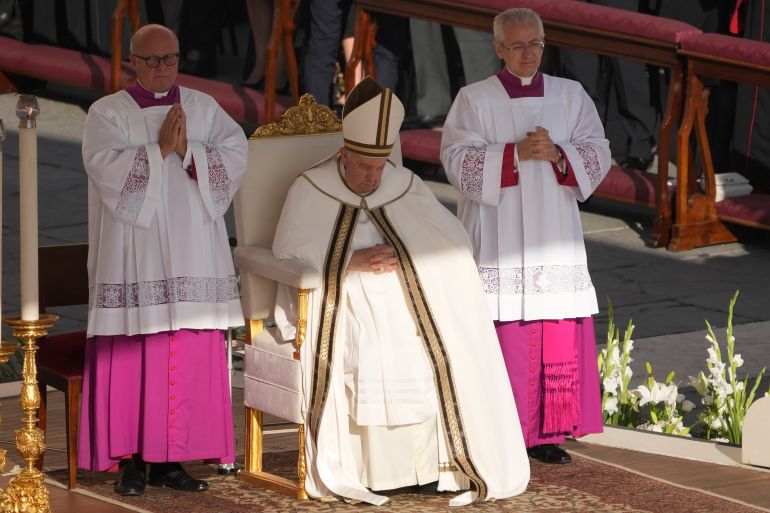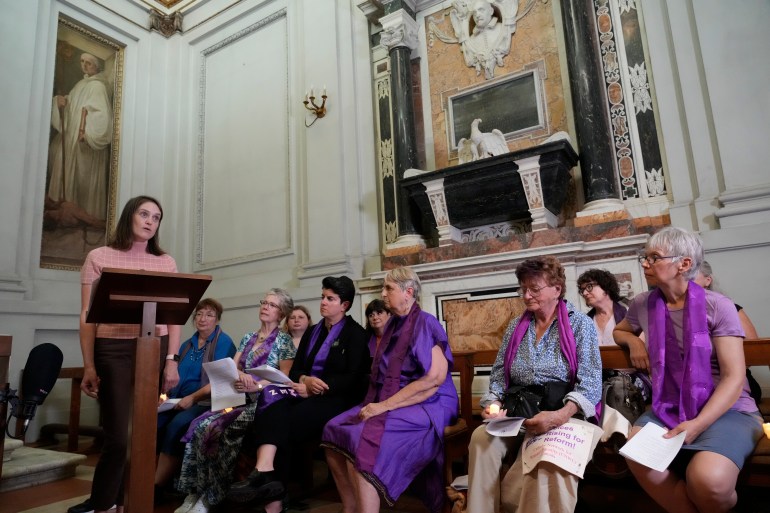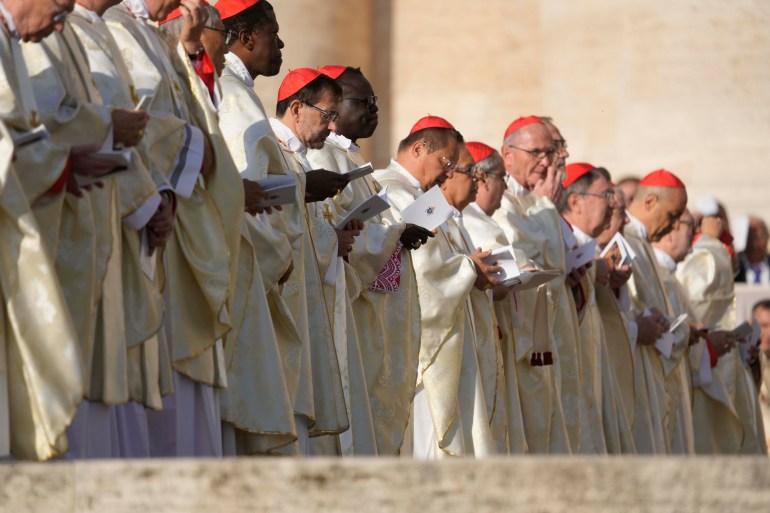Pope opens Vatican meeting amid tensions with conservatives
Pope Francis opens a global gathering of bishops and lay people to discuss the future of the Catholic Church including hot-button issues previously considered taboo.

Pope Francis has opened an important meeting on the future of the Catholic Church, with progressives hoping it will lead to more women in leadership roles and conservatives warning that church doctrine on everything from homosexuality to the hierarchy’s authority is at risk.
Francis presided over a solemn mass in St Peter’s Square on Wednesday to formally open the meeting, with hundreds of clergy from around the world celebrating on the altar before the rank-and-file Catholic lay people whose presence and influence at this meeting marks a decisive shift for the Catholic Church.
Keep reading
list of 4 itemsPope arrives in Portugal amid clergy sexual abuse scandal
Ex-pope Benedict accused of inaction in sexual abuse cases
The global scale of child sexual abuse in the Catholic Church
Rarely in recent times has a Vatican gathering generated as much hope, hype and fear as this three-week, closed-door meeting, known as a synod. It won’t make any binding decisions and is only the first session of a two-year process.
But it nevertheless has drawn an acute battle line in the church’s perennial left-right divide and marks a defining moment for Francis and his reform agenda.
Even before it started, the gathering was historic because Francis decided to let women and lay people vote alongside bishops in any final document produced.
While fewer than a quarter of the 365 voting members are non-bishops, the reform is a radical shift away from a hierarchy-focused Synod of Bishops and evidence of Francis’s belief that the church is more about its flock than its shepherds.
“It’s a watershed moment,” said JoAnn Lopez, an Indian-born lay minister who helped organise two years of consultations prior to the meeting at parishes where she has worked in Seattle and Toronto.
“This is the first time that women have a very qualitatively different voice at the table, and the opportunity to vote in decision-making is huge,” she said.

On the agenda are calls to take concrete steps to elevate more women to decision-making roles in the church, including as deacons, and for the Catholic faithful to have more of a say in church governance.
Also under consideration are ways to better welcome LGBTQ Catholics and others who have been marginalised by the church, and for new accountability measures to check how bishops exercise their authority to prevent abuses.
Women have long complained they are treated as second-class citizens in the church, barred from the priesthood and highest ranks of power yet responsible for the lion’s share of church work – teaching in Catholic schools, running Catholic hospitals and passing the faith down to next generations.
They have long demanded a greater say in church governance, at the very least with voting rights at the periodic synods at the Vatican but also the right to preach at mass and be ordained as priests or deacons.
While they have secured some high-profile positions in the Vatican and local churches around the globe, the male hierarchy still runs the show.
Lopez, 34, and other women are particularly excited about the potential that the synod might in some way endorse allowing women to be ordained as deacons, a ministry that is currently limited to men.
The potential that this synod process could lead to real change on previously taboo topics has given hope to many women and progressive Catholics and sparked alarm from conservatives who have warned it could lead to schism.

Even before proceedings began, five conservative cardinals publicly asked Francis to reaffirm Catholic doctrine on the treatment of gay couples and the ordination of women.
Their questions – entitled “Doubts” – were accompanied by an open letter to followers warning of the risk of “confusion” and “error”, amid criticism that the questions raised through the synod process could alienate many Catholics.
In a response made public on Monday, the 86-year-old pontiff appeared to suggest a way for the blessing of same-sex couples by clerics, something not recognised by the Holy See but practised in countries including Germany and Belgium.
While insisting that the church only recognises marriage between a man and a woman, the pope said that “we cannot be judges who only deny, reject and exclude”.
“Pastoral prudence must adequately discern whether there are forms of blessing, requested by one or more persons, that do not convey a mistaken concept of marriage,” he wrote.
A second session of the assembly is scheduled for October 2024, meaning that no concrete decisions are expected any time soon.